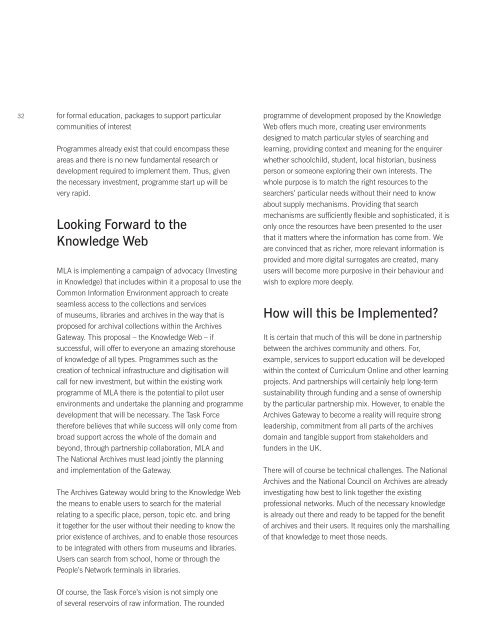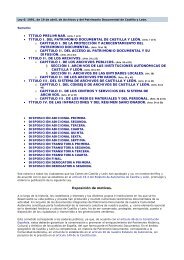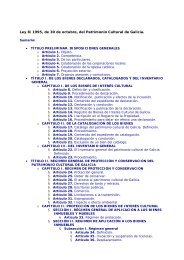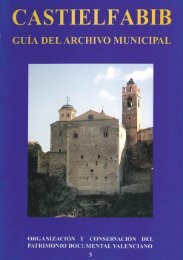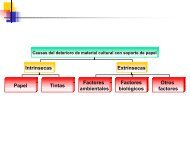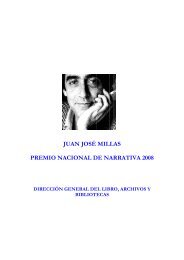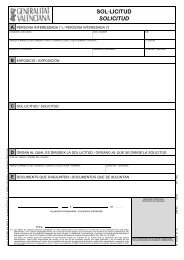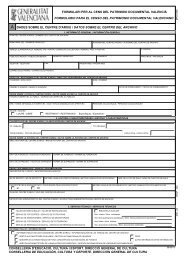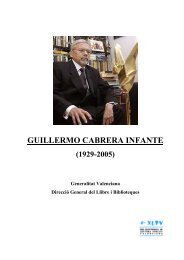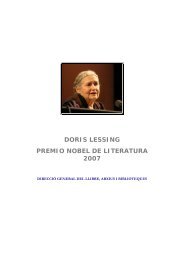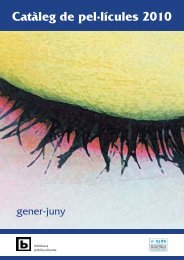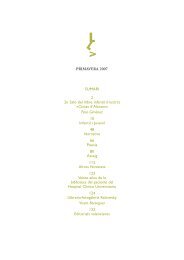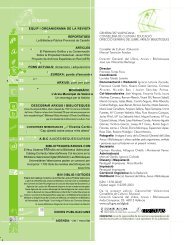Listening to the Past, Speaking to the Future
Listening to the Past, Speaking to the Future
Listening to the Past, Speaking to the Future
- No tags were found...
You also want an ePaper? Increase the reach of your titles
YUMPU automatically turns print PDFs into web optimized ePapers that Google loves.
32 for formal education, packages <strong>to</strong> support particularcommunities of interestProgrammes already exist that could encompass <strong>the</strong>seareas and <strong>the</strong>re is no new fundamental research ordevelopment required <strong>to</strong> implement <strong>the</strong>m. Thus, given<strong>the</strong> necessary investment, programme start up will bevery rapid.Looking Forward <strong>to</strong> <strong>the</strong>Knowledge WebMLA is implementing a campaign of advocacy (Investingin Knowledge) that includes within it a proposal <strong>to</strong> use <strong>the</strong>Common Information Environment approach <strong>to</strong> createseamless access <strong>to</strong> <strong>the</strong> collections and servicesof museums, libraries and archives in <strong>the</strong> way that isproposed for archival collections within <strong>the</strong> ArchivesGateway. This proposal – <strong>the</strong> Knowledge Web – ifsuccessful, will offer <strong>to</strong> everyone an amazing s<strong>to</strong>rehouseof knowledge of all types. Programmes such as <strong>the</strong>creation of technical infrastructure and digitisation willcall for new investment, but within <strong>the</strong> existing workprogramme of MLA <strong>the</strong>re is <strong>the</strong> potential <strong>to</strong> pilot userenvironments and undertake <strong>the</strong> planning and programmedevelopment that will be necessary. The Task Force<strong>the</strong>refore believes that while success will only come frombroad support across <strong>the</strong> whole of <strong>the</strong> domain andbeyond, through partnership collaboration, MLA andThe National Archives must lead jointly <strong>the</strong> planningand implementation of <strong>the</strong> Gateway.The Archives Gateway would bring <strong>to</strong> <strong>the</strong> Knowledge Web<strong>the</strong> means <strong>to</strong> enable users <strong>to</strong> search for <strong>the</strong> materialrelating <strong>to</strong> a specific place, person, <strong>to</strong>pic etc. and bringit <strong>to</strong>ge<strong>the</strong>r for <strong>the</strong> user without <strong>the</strong>ir needing <strong>to</strong> know <strong>the</strong>prior existence of archives, and <strong>to</strong> enable those resources<strong>to</strong> be integrated with o<strong>the</strong>rs from museums and libraries.Users can search from school, home or through <strong>the</strong>People’s Network terminals in libraries.programme of development proposed by <strong>the</strong> KnowledgeWeb offers much more, creating user environmentsdesigned <strong>to</strong> match particular styles of searching andlearning, providing context and meaning for <strong>the</strong> enquirerwhe<strong>the</strong>r schoolchild, student, local his<strong>to</strong>rian, businessperson or someone exploring <strong>the</strong>ir own interests. Thewhole purpose is <strong>to</strong> match <strong>the</strong> right resources <strong>to</strong> <strong>the</strong>searchers’ particular needs without <strong>the</strong>ir need <strong>to</strong> knowabout supply mechanisms. Providing that searchmechanisms are sufficiently flexible and sophisticated, it isonly once <strong>the</strong> resources have been presented <strong>to</strong> <strong>the</strong> userthat it matters where <strong>the</strong> information has come from. Weare convinced that as richer, more relevant information isprovided and more digital surrogates are created, manyusers will become more purposive in <strong>the</strong>ir behaviour andwish <strong>to</strong> explore more deeply.How will this be Implemented?It is certain that much of this will be done in partnershipbetween <strong>the</strong> archives community and o<strong>the</strong>rs. For,example, services <strong>to</strong> support education will be developedwithin <strong>the</strong> context of Curriculum Online and o<strong>the</strong>r learningprojects. And partnerships will certainly help long-termsustainability through funding and a sense of ownershipby <strong>the</strong> particular partnership mix. However, <strong>to</strong> enable <strong>the</strong>Archives Gateway <strong>to</strong> become a reality will require strongleadership, commitment from all parts of <strong>the</strong> archivesdomain and tangible support from stakeholders andfunders in <strong>the</strong> UK.There will of course be technical challenges. The NationalArchives and <strong>the</strong> National Council on Archives are alreadyinvestigating how best <strong>to</strong> link <strong>to</strong>ge<strong>the</strong>r <strong>the</strong> existingprofessional networks. Much of <strong>the</strong> necessary knowledgeis already out <strong>the</strong>re and ready <strong>to</strong> be tapped for <strong>the</strong> benefi<strong>to</strong>f archives and <strong>the</strong>ir users. It requires only <strong>the</strong> marshallingof that knowledge <strong>to</strong> meet those needs.Of course, <strong>the</strong> Task Force’s vision is not simply oneof several reservoirs of raw information. The rounded


